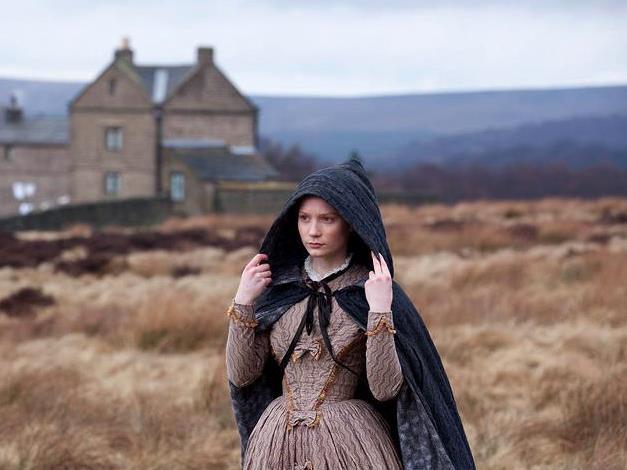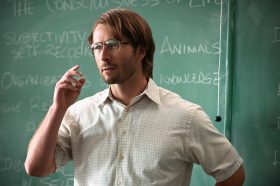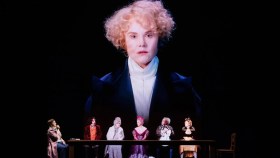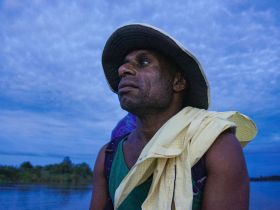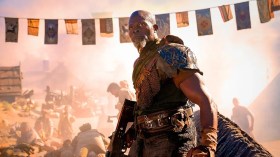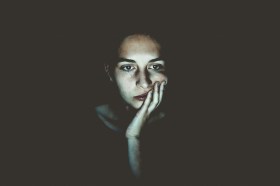Mia Wasikowska in “Jane Eyre”, 2011.
Mia Wasikowska is a world class actress, able to transform herself from Wonderland with the White Rabbit to the Tanami Desert with a herd of camels. She started on two eps of All Saints, went to the indy Australian film Suburban Mayhem, and was in Hollywood by the age of seventeen. Comfortable in Australia and Los Angeles, in demand as a wonderful actress, she is also becoming a director.
She comes from an excellent place to talk about Australian stories. It turns out she is also a lovely speaker and writer, who created a luminous moment at the AFTRS 8X8 event about the personal meaning of stories. This the first of eight transcripts, covering all the speeches.
This is what she had to say:
Hi. I’m going to start out with a little anecdote that I’ve used in the past to express my experience of the difference between American and Australian culture. Um, in America I hop into a cab and I get chatting to the driver. He asks me what I do, I say I’m an actor, we talk about films, we talk about acting. He asks me what I’ve been in, I tell him.
He’s excited for me. The parting sentiment is ‘good for you.’ The scenario plays out differently in Australia. I hop into a cab, get chatting with the driver, he asks me what I do, I say I’m an actor, we talk about films, we talk about acting. The parting sentiment is ‘stay normal.’ I get this a lot and it really bugs me.
I was talking to my brother about this earlier in the week and trying to decide if this was even relevant to this talk, and I’m still not sure that it is, but I was going to talk about it anyway. We were trying to work out what normal is to this guy, and maybe more to the point, what is he scared of?
I’ve spent the last ten years working in film industries around the world, and it’s given me an interesting perspective on our attitude to the arts here in Australia. It’s also given me a perspective on my attitude as a person towards being Australian, which brings me to the concept that I kept getting stuck on when writing this speech: being Australian.
Because this means a lot of things. Part of it means owning our violent colonial history towards First Nations people and the ongoing oppression towards minorities. My mother and grandmother migrated here in the 70s. My Grandma told my Mum they were going on a three week vacation to Austria. At the age of 11, my Mum ended up on a 3 month boat to Australia. She didn’t get to say goodbye to her father or the rest of her family.
They arrived in Canberra on the hottest day of the year, in the middle of a summer heatwave, dusty, dry and foreign. There are photos of them around this time sunbaking on the banks of Lake Burley Griffin. For those of you who don’t know Canberra and Lake Burley Griffin, that’s just not something that’s done. I have witnessed them navigate Australian culture over my lifetime and in turn tried to navigate it myself, like an unavailable parent that you want to please and piss off at the same time.
Our after school snack was a roast turkey and boiled potatoes, which our loving Grandma spent the best part of the day preparing. Not finishing being the worst insult imaginable led us to creative ways of hiding our meals. I remember opening my bedroom cupboard to find my sister’s plate of steaming fish and potatoes waft out at me.
My Grandma had an eastern European fear of cold drinks on the throat, which led us and all our friends to the mutual understanding that when she was in the house, you drink in secret from the bathroom tap to avoid a lecture on how cold water will lead to your death.
I remember the baffled faces of the McDonalds staff as Nana asked them to warm up the orange juice. I remember the vegetarians she offended by saying, ‘it’s not meat, it’s duck!’
At our Dad’s performances you could always spot her from the crowd by the glare of her fluorescent orange earmuffs that she wore to protect her ears from the loud music. These are my Australian stories, but these are the nice ones, the ones that make me mostly laugh. There are plenty that emphasise the loneliness and otherness experienced by migrants. There’s a lot I like about Australia. It’s where I grew up, it’s my home, it’s where I want to stay.
There’s a lot in our attitude that I think we need to look at. Films help us do this. Stories, the arts, our creative industries help us do this and we need to value them. They help us do this by allowing us a place to feel, by giving us the space to process our experiences and the impact they have on our lives and the lives around us. They connect us to our wider diverse communities.
This place to feel shouldn’t just be for creatives. It’s equally important that it’s valued by and accessible to labourers and athletes, lawyers, politicians. As a culture, I think we’re very resistant to emotions. I would know because I’ve made a career of feeling other people’s, but I’m learning to like my own and I’m learning that they’re important and I’m learning that they’re pretty similar to everybody’s else’s, regardless of their background.
This sort of understanding that we all have the same fundamental emotions means that if we make stories that explore these, we make stories that are meaningful and resonant around the world. The only thing that differs is the way in which we express them, the fun part, the part for our originality and authenticity to shine through.
We just need the courage and finances and the support to make them. We’re in a transitional world. That’s evident across all industries, but especially the arts, because the nature of distribution is changing. The ways — the more normal ways by which creative people got their work into the world, they’re all changing and nobody knows what the landscape will look like in years to come, which is intimidating, but also very liberating and exciting. Amongst all this change, we need to make sure that our voice stays in there, that our arts community can’t be left behind, because if we leave it behind, we leave behind the progression of our identity.
In order to not get left behind, we need to value the individual artist. In order to value the individual artist, we need to value our art schools, our film schools and our creative universities. They’re the places that nurture the people who represent us out in the world.
It helps to know who you are when making stories, and we know who we are by the stories that we’ve been told over our lifetime, not because these stories dictate our identity to us, but because we all have the opportunity to explore the unique emotional response that we have to them. Reflection helps us understand who we are, which helps us make stories to help others do the same. It’s an important cycle, and as we continue to refine our identity, the stories that we tell reflect that. Understanding that and putting it into practice is part of being a responsible adult. It’s part of being a responsible culture and a responsible society so that we don’t just pass down the same old stuff, the old ways, the old biases, the things that don’t serve us any more to our progression as a culture.
Most importantly, I think stories help us connect, and connection is fundamental to our happiness. So that’s all. Thanks.
—–
Read more: Stories cool. Australian stories?
